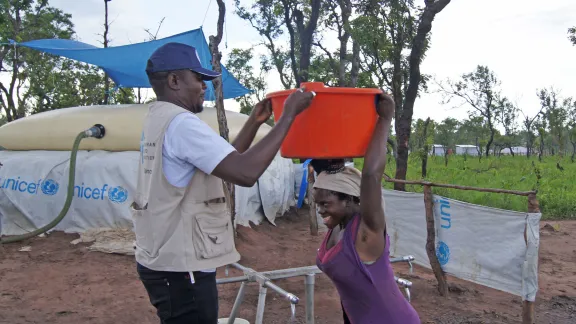
DRC refugees in Lovua settlement, Northern Angola. Photo: LWF/ C. Kästner
Refugees afraid to return, while food rations had to be cut in Angolan camps
(LWI) - Refugees from the Democratic Republic of Congo (DRC), who found refuge in Northern Angola after an outbreak of violence in the Kasai region, are afraid to return home, even as life in the refugee settlements becomes more difficult due to funding challenges, says Abrao Mushivi, the National Coordinator of The Lutheran World Federation (LWF) in Angola.
The outbreak of violence in the Kasai region of the DRC in March last year triggered the internal displacement of some 1.4 million people and the flight of over 31,000 refugees to Northern Angola. Refugees reported a wide range of human rights abuses including mass killings, mutilations, burning of property, destruction of villages, schools and churches, rape of women and girls, shortage of food and the lack of access to basic services and goods. Many are traumatised and have lost loved ones.
“I recently visited our field office, at the Angola – DRC border and the refugee camps in Northern Angola. The refugees were very insistent that they are not willing to go back to DRC unless the political situation is stable. If not, they may stay longer than expected” Mushivi says.
“The refugee community leaders told us firmly: you are asking us when we think to return to our country? If you knew what images we have in our heads, after what we experienced, you wouldn’t even ask”, Mushivi recalls a meeting at a refugee center with the delegation. The community leader was supported by the entire population present with shouts and whistling.
Funding a challenge
While refugees fear to go back to Kasai, the humanitarian response in Angola is underfunded. “Food rations had to be cut by 50 percent, causing acute food insecurity, there is insufficient water supply in the 41 already inhabited sections of the camp, and no water and sanitation facilities and systems in the 14 newly set up parts of the camp. The relocation of more than 8,500 refugees living in host communities 100 kilometers away from the Lovua refugee settlement had to be stopped, it is now harder for them to access services.
Our staff notices growing malnutrition in children, with young girls reportedly engaging in transactional sex to earn something. The refugee community, but also humanitarian actors and the Angolan government are very concerned about these developments.
“Our staff notices growing malnutrition in children, with young girls reportedly engaging in transactional sex to earn something. The refugee community, but also humanitarian actors and the Angolan government are very concerned about these developments”, Mushivi says. “The funding challenges are also hindering the transition from emergency aid to making the community more self-reliant.”
LWF together with local partners has launched an ACT appeal for more funding [Angola_DRC Refugee emergency assistance in Lovua refugee Settlement-ANG 181]
“We hope that there will be more support to make a significant change in the lives of the refugees and the host communities. We would also highly appreciate your advocacy in supporting the refugees, and your prayers for peace and stability in DRC, says LWF National Coordinator Mushivi says.
Long-standing engagement in Angola
LWF was among the first humanitarian actors assisting the DRC refugees in Dundo, Northern Angola, when the crisis started in April 2017. The organization established Lovua camp, installed shelter, water tanks and latrines and is now responsible for the entire infrastructure in Lovua, which includes a system of solar panels, a transit centre, and the medical centers.
LWF has been working in Angola since 1986, as one of the major aid organizations providing emergency relief and rehabilitation at the height of the Angolan civil war. Since the peace agreement in 2002, support to Angola has transitioned to a long term development program focusing mainly on integrated rural development, land rights and human rights through the UN Universal Periodic Review process.


